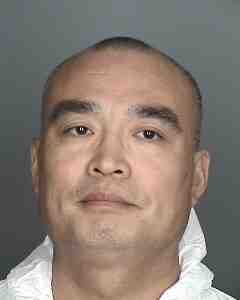
A former researcher at Mount Sinai’s medical school has been sentenced to 28 years in prison for shooting the dean that fired him.
On the morning of Aug. 29, 2016, Chao, 50, attacked Dennis Charney, dean of the Icahn School of Medicine at Mount Sinai, with a shotgun outside a deli in suburban New York. In 2010, Charney fired Chao for scientific misconduct. Charney survived the shot, but was hospitalized for five days.
As reported by the Chappaqua-Mount Kisco Patch yesterday, Judge Barry Warhit sentenced Hengjun Chao to 23 years, each, for attempted murder and assault, to be served concurrently; the maximum sentence for the attempted murder charge that Chao faced was 25 years. The judge also sentenced Chao to the maximum for criminal use of a firearm — five years — which will be served consecutively, bringing the total to 28 years.
In June, a New York jury found him guilty of attempted murder and the two other felony charges.
Stewart Orden, Chao’s defense attorney, told Retraction Watch he was “shocked at the sentence:”
[T]he sentence was grossly excessive for a man driven by a clinically diagnosed, psychiatric [Diagnostic and Statistical Manual of Mental Disorders] defined illness.
Orden added that he will be filing an appeal for both the verdicts and the sentencing. Chao remains in the custody of the New York State Department of Corrections.
In 2010, Chao sued Mount Sinai following his termination, but lost on appeal. The Office of Research Integrity declined to pursue the misconduct finding and an ORI investigator later said the Mount Sinai investigation was flawed and inadequate.
A spokesperson for Westchester County District Attorney Anthony Scarpino, Jr. told Retraction Watch:
Judge Warhit saw this as a premeditated act. That resulted in the sentence.
In a statement, the Westchester DA’s office said Chao had been waiting for Cherney:
Video surveillance evidence showed the defendant had stalked the victim for several days prior to the shooting.
When the victim left the deli, the defendant retrieved a loaded shotgun from the trunk of his car. He walked towards the victim, took aim and fired one shot, hitting him in the shoulder and chest area.
Like Retraction Watch? Consider making a tax-deductible contribution to support our growth. You can also follow us on Twitter, like us on Facebook, add us to your RSS reader, sign up on our homepage for an email every time there’s a new post, or subscribe to our daily digest. Click here to review our Comments Policy. For a sneak peek at what we’re working on, click here.
https://patch.com/new-york/chappaqua/sentence-chappaqua-revenge-shooting
“Dr. Chao, 50, had been a research assistant professor at the Icahn School of Medicine at Mount Sinai. He was fired in May 2009 by a committee that included Dr. Dennis Charney, who is the dean of the medical school. Dr. Chao accused a colleague of falsifying data; the school in turn accused him of the same thing.
However, Retraction Watch reported that the Office of Research Integrity at the U.S. Department of Health and Human Services decided not to pursue findings of research misconduct. The blog cited an ORI investigator who said the school’s investigation report was “inadequate, seriously flawed and grossly unfair in dealing with Dr. Chao.”
So many unanswered questions.
Did Chao’s make his original accusation in good faith or at least according to the rules?
If so, why did he not have whistleblower protection?
The school accused Chao of misconduct – was this charge made in good faith?
ORI says they would not pursue the investigation against Chao, so how weak was the charge?
Fairly weak I think. If you read the original report, he does appear guilty of data manipulation, but others were involved and it was a “he said, she said” type of case. It’s not entirely clear that he was engaged in outright misconduct, and it appears the committee made it’s judgement based largely on his behavior and response to questions during interviews (which were a little odd!!). The post-doc involved certainly had some role to play, based on reading the report.
At most schools a research assistant professor is not tenured and would not be on tenure track.
Icahn simply could have opted not to renew his contract.
Seems like a lot of the story remains untold.
Particularly not one who was 50 (or at least 49). No doubt there might be some exceptions….